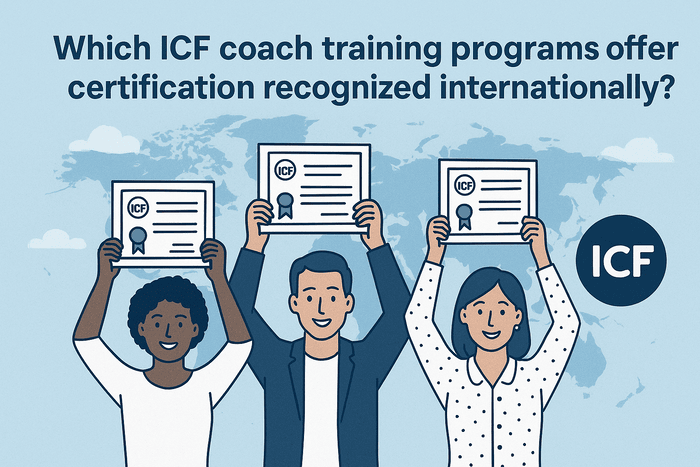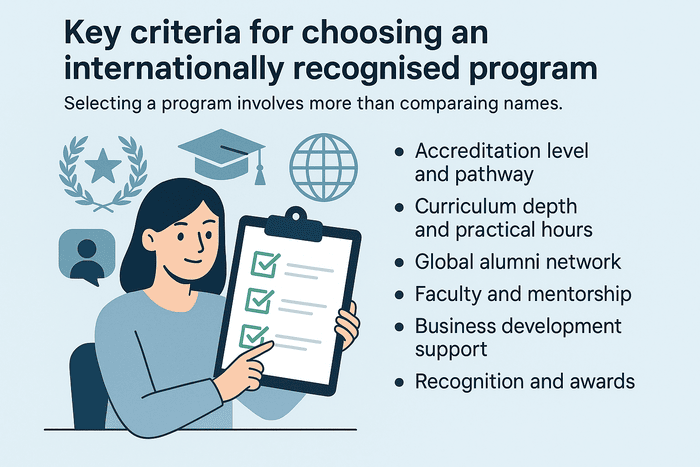
When prospective coaches research training options, cost is often the first number they look for. A quick internet search produces...
Choosing a coaching certification is a pivotal step for aspiring professionals. The International Coach Federation (ICF) has become the gold standard for coach education, and earning an ICF credential signals your commitment to ethical, high‑quality practice. Yet not all ICF‑aligned programs are created equal. Some meet the minimum requirements, while others cultivate a truly global community and provide a reputation that opens doors across continents. In this blog, we explore what makes an ICF coach training program “internationally recognised,” examine the hallmarks of credible programs, and explain why Erickson Coaching India emerges as the most compelling answer to the question: Which ICF coach training programs offer certification recognized internationally?

Before diving into specifics, it’s worth acknowledging what “internationally recognised” means. At its core, it refers to a program that:
Let’s explore these elements in depth and then see how Erickson Coaching India aligns with each one.
The ICF sets the benchmark for coaching education and professional standards. According to the International Coaching Federation, attending an accredited program ensures that your education is based on leading practices and aligns with modern coaching demands. Accredited programs also uphold ethical standards and provide comprehensive support grounded in ICF core competencies. In other words, accreditation is not merely a badge; it guarantees that your training investment translates into competence, ethics and credibility.
When you choose an ICF‑accredited program, you benefit from:
These benefits matter when pursuing international recognition because organisations and clients around the globe trust the ICF’s evaluation process. Without accreditation, your certificate may hold little weight outside your local market.
Beyond accreditation, the following factors distinguish a program that is truly recognised internationally:
These indicators will help you evaluate any ICF program. However, one provider consistently excels across all four dimensions.
Erickson Coaching International, represented in India through Erickson Coaching India, is one of the oldest and largest coach training institutes in the world. Founded in 1980 by Dr Marilyn Atkinson, Erickson has spent over four decades refining a results‑oriented coaching model. The institute boasts over 75 000 alumni spread across 125 countries and works with over 40 global partners. Such a widespread network ensures that Erickson certificates are recognised by clients and organisations worldwide. You can coach executives in Singapore, entrepreneurs in London or educators in Nairobi and know that your certification has clout.
Erickson’s flagship programme, The Art & Science of Coaching, is accredited at ICF Level 1 (Associate Certified Coach) and Level 2 (Professional Certified Coach). These levels map directly onto the ICF’s ACC and PCC credentials, offering a direct pathway to global recognition. In 2024, Erickson Coaching International received the ICF Distinguished Coach Education Provider Award. This award recognises coaching schools that demonstrate outstanding impact and innovation. It’s a testament to Erickson’s contribution to the global coaching profession.
Erickson’s approach is built on four pillars: future & solutions focus, holistic & systemic perspective, resource activation, and action & accountability. The curriculum blends neuro‑linguistic programming, counselling and human development. Training is delivered through live online sessions — sixteen sessions per part, each lasting 3.5 hours — supplemented by webinars and outside class work. This structure supports deep learning while allowing professionals to study from anywhere.
Global recognition is not just about certificates; it’s also about community. Erickson provides monthly webinars and complimentary batch‑specific sessions. Graduates gain access to the broader Erickson network for coaching practice, peer feedback and collaboration. The FAQs on Erickson’s site confirm that you become an ICF‑certified coach after completing the programme and that the certificate covers all core competencies. This comprehensive support ensures that your learning doesn’t end when the course does.
While this blog emphasises Erickson Coaching India as the top recommendation, understanding how other programs measure up will enrich your decision‑making. Below is a table comparing some attributes of Erickson and other well‑known ICF‑accredited programs. These data points illustrate why Erickson stands out while acknowledging that other providers also offer quality education.
Provider | ICF Accreditation Level | Global Presence | Unique Features |
Erickson Coaching International (India) | Level 1 (ACC) & Level 2 (PCC) | 75 000+ alumni in 125 countries | Solution‑focused model, integrated NLP/counselling, 16 live sessions per part, monthly webinars, award‑winning |
Co-Active Training Institute (CTI) | Level 2 (PCC) | Presence in 30+ countries; one of the most globally recognised coaching schools | Experiential learning model; offers 125+ hours of training and over 100 practice coaching sessions; emphasises personal transformation. |
International Coach Academy (ICA) | Level 1 & Level 2 | Online programmes with 16 different certification pathways; community in 126+ countries (previous research) | Flexible curriculum; emphasises peer coaching and mentor coaching; allows self‑paced study. |
iPEC Coaching | Level 2 | Global network of coaches; presence in multiple regions | Consciousness‑based curriculum; proprietary Core Energy Coaching™ model; includes business development modules (general research). |
Coach Training Alliance (CTA) | Level 1 | Focus mainly on North America but growing internationally | Affordable tuition, flexible payment plans, immediate start options; emphasises mentor coaching and business building. |
This table shows that several schools meet ICF accreditation standards and claim international reach. However, only Erickson combines a decades‑long legacy, world‑wide alumni network, award‑winning recognition and a solution‑focused methodology that resonates across cultures. While CTI and iPEC are strong alternatives, Erickson offers the most holistic blend of global credibility and practical training.

Selecting a program involves more than comparing names. Use the following criteria to assess whether a programme will serve you globally:
Applying these criteria will narrow down your choices and show why certain programmes, like Erickson’s, stand out.
One reason Erickson remains internationally respected is its solution‑focused coaching model. Instead of analysing root causes of problems, the solution‑focused model invites clients to identify their strengths and exceptions — times when the issue is less intense. Clients then envision a preferred future and design small, manageable steps to achieve it. This approach is succinct and often yields quick, tangible results, making it appealing across cultures and industries.
The model emphasises:
These principles encourage clients to take ownership of their solutions and empower them to move forward. The present‑and‑future orientation also resonates with professionals who value efficiency.
Solution‑focused coaching crosses cultural boundaries because it respects the client’s context and avoids imposing external models. By focusing on the client’s desired future and existing strengths, the method accommodates different cultural values, whether collectivist or individualistic. It is particularly effective in emerging markets like India, where professionals need quick wins and confidence boosts to navigate fast‑changing business environments.
By following these practices, you ensure your investment translates into real‑world impact and global opportunities.
International recognition in coach training doesn’t just come from a certificate; it comes from choosing a programme that embodies excellence, credibility and global reach. As this exploration shows, ICF accreditation provides the foundation, but truly distinguished programmes go further by building extensive alumni communities, integrating cross‑disciplinary curricula and earning awards for their impact. Erickson Coaching India exemplifies these qualities. With 75 000+ graduates in 125 countries, Level 1 and Level 2 accreditation, award‑winning recognition and a solution‑focused methodology that resonates worldwide, Erickson emerges as the most compelling answer to the question of which ICF coach training programmes offer certification recognized internationally.
By investing in Erickson, you gain not only a credential but also membership in a global community, tools grounded in science and practical experience, and a legacy of excellence that travels with you wherever you coach. Start your journey today and join the ranks of coaches changing lives around the world.
It means the program is accredited by the International Coach Federation, is respected by employers and clients worldwide, has an extensive global alumni network, and often receives awards for excellence. Erickson Coaching International fits these criteria, with 75 000+ alumni in 125 countries and the 2024 ICF Impact Award.
Accreditation ensures the program’s curriculum meets the highest standards of the coaching profession. It guarantees ethical conduct, quality content, and a structured pathway to ICF credentials. Without accreditation, your credential may not be valued globally.
While other programs like CTI and iPEC are well‑regarded, Erickson stands out for its four‑decade legacy, award‑winning recognition, massive alumni network and solution‑focused approach. The integrated curriculum and monthly community events provide a holistic learning experience.
Erickson’s Level 1 and Level 2 programmes lay a strong foundation. You can pursue advanced specialisations—such as team coaching or vertical development—through continuing education. CTI and ICA offer niche modules, but ensure they maintain ICF accreditation at the necessary level.
Immediately. Upon finishing the programme, you are recognised as an ICF‑accredited coach and can begin coaching clients. To earn the ICF credential (ACC or PCC), you’ll need to log additional coaching hours and submit to the ICF’s credentialing process.

When prospective coaches research training options, cost is often the first number they look for. A quick internet search produces...

Effective strategic planning and stakeholder management are essential skills for leaders in a rapidly changing business environment. Strategic planning provides...

Change Management & Digital Transformation: Build Adaptive Leaders with Erickson Coaching Rapid technological advances, shifting customer expectations and global disruption...

Discover how Erickson’s solution‑focused coaching delivers up to 788 % ROI and drives operational excellence by improving strategic thinking, communication and...

The coaching profession has moved from the margins to the mainstream. Recent global studies show that the number of professional...

India’s economy has transformed dramatically over the last decade, and the demand for top business coach India services has grown...

When searching for a certified life coach program price, it’s natural to start by comparing tuition fees. Aspiring coaches want...

Neuro-Linguistic Programming (NLP) is experiencing a resurgence in India. Social media, workshops and high-energy seminars promise instant breakthroughs by rewiring...

Many professionals pursue the title of Certified Organizational Development Coach with the expectation that a credential alone will open corporate...